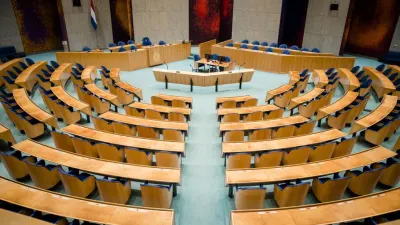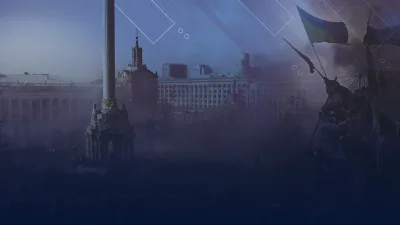FVD denounces the invitation of President Zelensky to address the Dutch House of Representatives and will be absent during his speech and from the ensuing parliamentary debate
On Thursday 31 March, Ukrainian President Volodymyr Zelensky will give a virtual address to the Dutch House of Representatives. The parliamentary group of Forum for Democracy in the House of Representatives will not attend this speech, nor will it participate in the debate that follows.
Explanation.
Zelensky's planned speech to the Dutch House of Representatives represents a radical break with a democratic tradition that has existed for over 170 years. Never before in the history of Dutch democracy has a foreign head of state spoken in the House of Representatives.
There is a good reason for this: democratic decision-making in the Dutch parliament should be entirely independent, shielded from foreign influence and unhindered by foreign interests
It is well known that in war, truth is the first casualty. In the 'fog of war' it is extremely difficult to distinguish propaganda from facts. In recent years the reality behind claims, accusations and heroic stories from conflict zones has turned out to be very different from what was believed at first.
Of course, sometimes decisions must be made on the basis of incomplete information. However, the House of Representatives should at least strive to be a place where situations in the Netherlands and the rest of the world are examined with restraint and detachment, and after considering both sides of the argument. That is what a parliament with a majority and an opposition is for. In doing so, the interests of only one nation should prevail: the Netherlands.
Taking sides in a conflict on emotional grounds, on the basis of personal sympathy, or while enthralled by a moving speech, has absolutely no place in such considerations. Indeed, it is incompatible with it.
These same arguments have already prevented the Austrian parliament from giving Zelensky a platform: the leader of the Austrian party, the FPÖ, said, "We wouldn’t want Putin to have this opportunity either, nor any other warring party for that matter."
The Dutch Parliament should take the same course. The Dutch Parliament is not a platform for unilateral declarations of support and it certainly should not act as such in highly complex international conflicts.
It is naive to see Zelensky as some sort of saint. He recently banned eleven political parties, including the country's largest opposition party. Critical TV stations have been banned in the country for some time, while the remaining TV stations have recently been obliged to broadcast propaganda 24 hours a day. Zelensky has refused to respect the Minsk accords which are part of a UN Security Council resolution and to which the Netherlands and the EU have committed themselves. He has defended Ukraine’s 8-year war against its own people in the Donbass, even though this is the immediate cause of the current conflict. He is also known to take part in dubious financial constructions, as revealed by the Panama Papers. A part of his army poses with Nazi symbols in unsavoury poses. And recently, the most terrifying acts of violence towards helpless Russian prisoners of war by what are most probably Ukrainian troops have been leaked via social media. All this makes a virtual address by Zelensky to the Dutch parliament inappropriate, to say the least.
This is not to take sides in this conflict, but rather to say that, as far as Forum for Democracy is concerned, the situation in Ukraine does not deserve such a simplistic approach of right versus wrong. Those who want to contribute to a lasting peace, or even to a real understanding of the current and extremely regrettable situation, should look at the circumstances in a more nuanced way. Pointing an accusing finger at one of the warring parties will further escalate the situation by idealising one of the belligerents in a conflict in which at least three parties are involved, or going along with the war rhetoric of the moment, stands in the way of a swift and sustainable end to the violence.
Concerning the debate, FVD does not believe that the right time for reflection is immediately after a speech by a presumably very emotional president who is involved in direct military action, and who will undoubtedly claim feelings of sympathy and heightened urgency.
Would it be possible to have a well-considered, balanced discussion in the House of Representatives about the Palestinian-Israeli conflict after first showing a documentary about growing up in Gaza? It is simply not the task of a national parliament to offer a unilateral platform for the interpretation of one side of an issue or conflict, or to conduct a debate immediately afterwards while emotions run high.
FVD wishes to be quite clear about this: even if this were a universally supported and conflict-free issue on which everyone was in agreement - for example, combating child abuse, saving seals, or reducing plastic in the ocean – the party would still not be in favour of foreign heads of state addressing the Dutch House of Representatives.
FVD’s position with regard to the situation in Ukraine is well known and has already been explained at length in various parliamentary contributions. FVD remains in favour of a diplomatic solution in which a balanced compromise is sought in a trilateral context (Russia, Ukraine and NATO/EU) which does justice to the interests of, first and foremost, the Ukrainians themselves (and by this is meant all Ukrainians, not just the Western Ukrainians), but also those of Russia and Europe/America.
FVD will, of course, take part in debates on this subject at the next opportunity. But on Thursday 31 March, we owe it to our democracy to remain silent.





